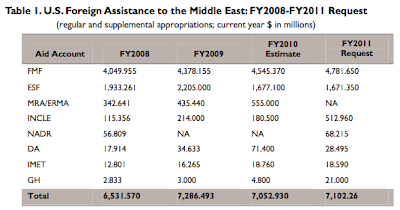The United States has been a big financial backer of Egypt since the signing of the Carter peace treaty between Israel and Egypt back in March of 1979. A recent Congressional Research Service report by Jeremy Sharp looks at the details.
As we have new seen, the Egyptian political scene is fraught with polarization; on one hand, we have the anti-Morsi demonstrators and on the other, the more conservative pro-Morsi, pro-Muslim Brotherhood side of the equation. Behind all of this, the Egyptian military pulls the strings; controlling the nation's security and parts of its foreign policy decisions.
Morsi's government never really gained control of key parts of Egypt's internal security. The Muslim Brotherhood was unable to control and reform the Interior Ministry and the national police forces which, over the past two years, have been essentially at war with street protestors. An International Herald Tribune story from January 30, 2013 even related the story of security forces officers cursing at their new boss (the Minster of the Interior) when he attended the funeral for two security officers that were killed in the ongoing clashes.
Egypt's economy has done poorly since the revolution began in 2011, suffering from stagflation, a combination of high inflation and lack of economic growth similar to what the United States experienced during the 1970s. In 2012, real GDP grew by 2.2 percent; while that doesn't sound terrible compared to the growth levels being experienced by the world's developed economies, keep in mind that this figure is essentially the growth rate of Egypt's population which stood at
1.73 percent in 2011. Egypt has a very high bill for public sector salaries and subsidies; it is estimated that the budget deficit this year could range from $26 billion to $31 billion or a staggering 10 percent of GDP.
Now, on to the subject of this posting; the relationship between the U.S. government and Egypt's military. The United States has three areas of interest in Egypt's domestic affairs:
1.) Maintaining U.S. Navy access to the Suez Canal.
2.) Maintaining the 1979 Israel – Egypt peace accord.
3.) Promoting democracy and economic growth in Egypt.
How much aid has the United States provided to Egypt over the decades to ensure that Egypt remains "on side" and that American interests in the region are preserved? Between 1948 and 2011, a total of $71.6 billion in bilateral foreign aid was provided to Egypt by successive American governments including $1.3 billion annually for military aid from 1987 to the present. Interestingly, this puts Egypt in second place among all recipients of U.S. aid. Bet you can't guess who number one is, can you? Ironically, it's Egypt's former archenemy Israel!
As an aside, apparently, all of that aid largesse to Israel was not enough. In 2007 the Bush II Administration signed a 10 year Memorandum of Understanding with Israel that would see U.S. military aid to Israel increase from $2.4 billion in fiscal 2008 to over $3 billion in fiscal 2018. Unfortunately, there was no accompanying increase in the level of military aid to Egypt.
In fiscal 2011 alone, Egypt received almost 25 percent of all United States Foreign Military Financing (FMF) and Israel received nearly 60 percent. Egypt's allotment is divided into three categories:
1.) Acquisitions.
2.) Upgrades to existing equipment.
3.) Support and maintenance contracts.
For example, under the terms of one contract for the co-production of the M1A1 Abrams tank, some components of the tank are manufactured near Cairo and the remaining components are produced in the United States and assembled in Egypt. Under this program, Egypt is expected to acquire 1200 tanks with American taxpayers funding roughly 80 percent of the total cost.
The United States also provides training for Egyptian military officers under the International Military Education and Training (IMET) account and supplies the country with hundreds of millions of dollars worth of
Excess Defense Articles, a program that offers excess defense articles to foreign governments "…in support of U.S. national security and foreign policy objectives.". As well, since 1980, Egypt has acquired over 220 F-16s making it the world's fourth largest operator of the fighter aircraft. In January 2013, four new F-16s arrived in Egypt and delivery of an additional 16 are pending over the remainder of this year; the value of these F-16s is estimated at $2.5 billion.
To summarize, here is a chart showing the United States assistance to Egypt from 2010 to 2014:
Please note that ESF stands for Economic Support Fund, INCLE stands for International Narcotics Control and Law Enforcement and NADR stands for Nonproliferation, Antiterrorism, Demining and Related Programs.
To put Egypt into perspective,
here is a chart showing the total United States foreign assistance to the Middle East for the period from 2008 to 2011:
It looks like the appearance of "peace" in the Middle East comes at a high cost to American voters.
Many analysts have been critical of the United States aid policy to the Middle East and to Egypt in particular because it may well be exacerbating tensions in the region and may also be propping up dictatorships. In the case of Egypt, it may well be that American military aid inadvertently bolstered the Mubarak regime. Only time will tell whether this distortion of political power and "democracy" will continue with the next leader of Egypt, a point that is particularly pertinent now that the military is once again intimately involved in the daily running of the country.
Oh what a tangled web….
Click
HERE to read more of Glen Asher's columns
You can publish this article on your website as long as you provide a link back to this page.



Be the first to comment